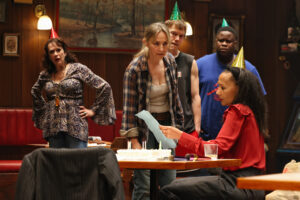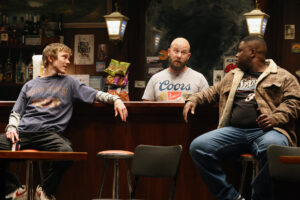Wharf 1 Theatre, November 15
8/10
It is no coincidence that Lyn Nottage’s Sweat arrived in 2015, the year Donald Trump erupted on to the US political landscape. Nottage’s story – the demise of Rust Belt manufacturing, with its consequent social and economic upheaval – is precisely what underpinned Trump’s MAGA movement. The playwright spent two and a half years interviewing residents of Reading, Pennsylvania, before putting pen to paper. While not a verbatim play, it is based on the realities of Reading losing its textile and steel industries, and the employees’ bewilderment and bitterness after generations of job security.
Unable to survive, the community becomes a dog-eat-dog world of shattered friendships, families and racial cohesion. At the play’s epicentre is the irreparable rent in the long-term friendship between black Cynthia (Paula Arundell) and white Tracey (Lisa McCune). This comes when Cynthia is promoted from the steel mill’s shop floor into air-conditioned management – just before the owners pressure the workforce to take a plunge in pay and conditions, or be locked out and replaced, often by Latin American migrants.

Cynthia is a class traitor in Tracey’s eyes, but there’s also a racial dimension: a suspicion of the favouring of minorities in Cyn’s promotion. Cynthia, meanwhile, wonders if she was promoted precisely to be the fall guy for the lockout.
In Zindzi Okenyo’s STC production, the gifted Arundell makes Cyn so warm, bubbly and likable as to retain our sympathy, even when there’s some truth to Tracey’s accusations. McCune so thoroughly reinvents herself as to be almost unrecognisable as the relentlessly spiky Tracey, whose cause has justice, but who goes too far in its pursuit. The third member of this one-time triumvirate is Jessie, engagingly played by Deborah Galanos, who’s natural vivacity cracks, and who slides into world-weariness and a default of drunkenness in what’s already a hard-drinking world.
Tinashe Mangwana and James Fraser play – and sometimes overplay – Chris and Jason, the short-fused sons of Cynthia and Tracey, respectively, and Markus Hamilton excels as both Cynthia’s downward-spiralling husband and a parole officer.

Most of the action takes place in bar managed by Stan (a brilliant Yuri Covich), who’s assisted by Oscar (Gabriel Alvarado). Oscar’s prepared to cross the steel-mill picket line to earn $11 an hour rather than his $8 in the bar, making him even more the enemy than the bosses.
Stan is the consistent voice of reason and sometimes a chorus-like commentator on the action. “I watch these politicians talking bullshit and I get no sense they even know what’s going on beyond the windshield of their cars as they speed past,” he tells Cynthia. And then when Chris and Jason are on the warpath he suggests they just leave town, instead. “Sometimes I think we forget we’re meant to pick up and go when the well runs dry,” he explains. “You stay put for too long… your life becomes this pathetic accumulation of… emotional and physical junk.” Needless to say, they don’t listen to him. In fact, no one’s listening to anyone by the end, although the climactic fight is not staged to maximum dramatic effect.
To see this the night after Tracy Letts’ August: Osage County is to marvel at the quality of 21st-century US playwriting. Both deal with the unravelling of the country’s social fabric. Letts’ is the more poetic and emotionally searing, but Nottage’s is exceptional in its own way, and Okenyo’s production, with set by Jeremy Allen and semi-industrial music by Brendon Boney, is the more even.
Until December 22.